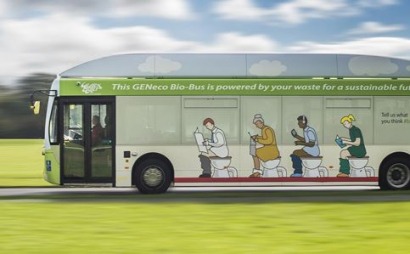
The 40-seater Bio-Bus, which runs on gas generated through the treatment of sewage and food waste that's unfit for human consumption, helps to improve urban air quality as it produces fewer emissions than traditional diesel engines.
Running on waste products that are both renewable and sustainable, the bus can travel up to 300km on a full tank of gas generated at Bristol sewage treatment works – a plant run by GENeco, a subsidiary of Wessex Water.
GENeco is the first company in the UK to start injecting gas generated from food waste and sewage into the national gas grid network and at the same time installed a gas refuelling plant for the bus.
“Through treating sewage and food thats unfit for human consumption we're able to produce enough biomethane to provide a significant supply of gas to the national gas network that's capable of powering almost 8,500 homes as well as fuelling the Bio-Bus," said GENeco general manager Mohammed Saddiq.
“Gas powered vehicles have an important role to play in improving air quality in UK cities, but the Bio-Bus goes further than that and is actually powered by people living in the local area, including quite possibly those on the bus itself," Saddiq conitnued.
The Bio-Bus can travel up to 300 km on a full tank of gas, which takes the annual waste of around five people to produce.
The first passengers to board the Bio-Bus were visitors to the UK who were commuting from Bristol Airport to the historic city of Bath.
Bath Bus Company, which is operating the service, said the bus was greener for the environment and added that it was extremely pleased to be using the Bio-Bus for its rapidly growing A4 service from Bath to Bristol Airport via South Bristol.
Bristol sewage treatment works treats around 75 million cubic metres of sewage waste and 35,000 tonnes of food waste, collected from households, supermarkets and food manufacturers, every year.
Through a process, known as anaerobic digestion, 17 million cubic metres of biomethane is generated a year at the Bristol plant – the equivalent of meeting the power needs of 8,300 homes. A newly built state-of-the-art gas plant injects the gas into the grid.
The Bio-Bus has received backing from a number of businesses including the manufacturer of the bus, Scania, as well as companies including Roadgas, CNG Services Ltd, Dampney’s Agri Environmental, Trant, Grontmij and AIR Decker.
In 2010 GENeco powered a car on biomethane produced during the sewage treatment process. The Bio-Bug was used in various trials to see how viable it was to power a vehicle on sewage gas.
For additional information:

